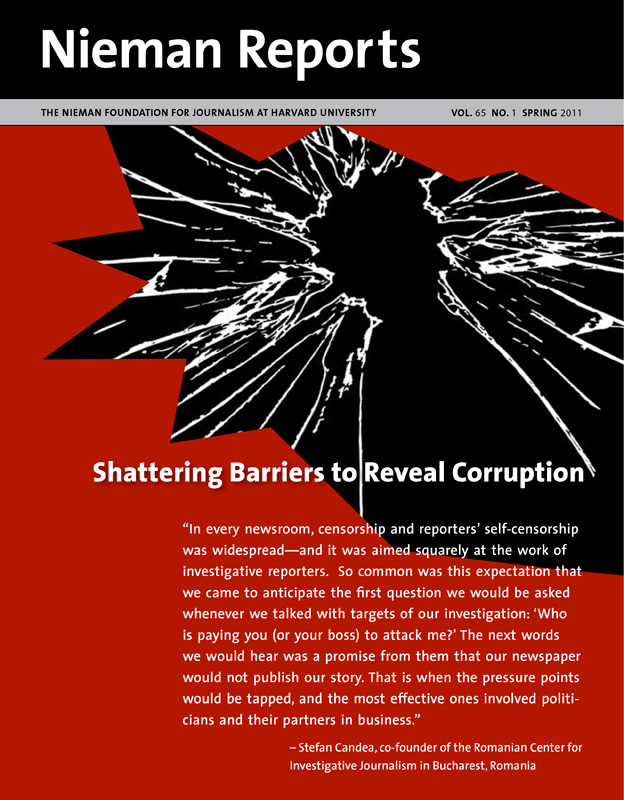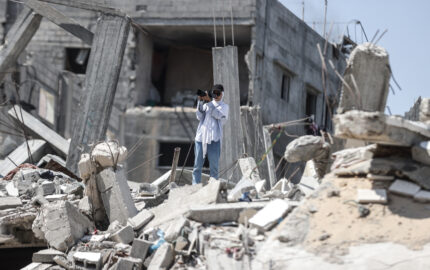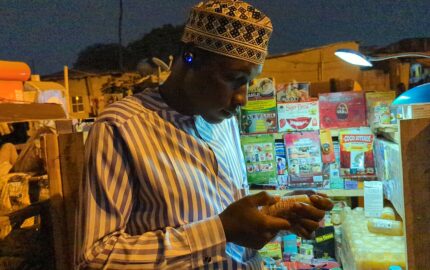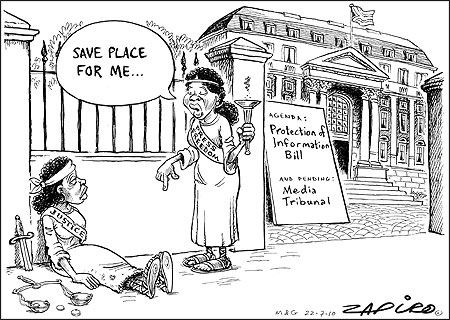
After the African National Congress party proposed a media tribunal and Protection of Information bill, Zapiro drew this cartoon for the Mail & Guardian in South Africa. Reprinted with permission. For more Zapiro cartoons visit www.zapiro.com.
It was last summer, on August 4, that South Africa's news media confronted its most sinister moment since the fall of apartheid in 1994. Over the last 16 years, the press had become almost complacent about its hard-won freedom. Bolstered by one of the most progressive constitutions in the world, the media organizations had operated with carefree independence. But stories of corruption—particularly those of kickbacks in a $6.7 billion arms deal and government contracts being covertly dished out to the powerful—didn't impress the ruling African National Congress (ANC).
For months, the ANC had darkly threatened to install a media tribunal to rein in irresponsible journalists, a body accountable to politicians with the power to jail incorrigible hacks. This, while a new Protection of Information law was being written that would put virtually all government information behind a wall of secrecy and make criminals out of whistleblowers.
Editors and journalists largely saw this as bluster, threats unlikely to be codified because the politicians would surely remember that it was a free press that helped draw the world's attention to the plight of apartheid. Nonetheless, the chorus within the ANC was growing stronger, fueled by Julius Malema, the brash and provocative leader of the ANC's Youth League who had been savaged by a glut of stories about shady government contracts his companies had won.
Government vs. the Press
The heroic journalists of the apartheid era who had defied the tyrannical whites-only government weren't in any mood to surrender their new liberties. So on that early August day journalists from across the board attended a special meeting at the offices of Avusa, the company that publishes the Sunday Times, to thrash out a response. At that moment a cadre of 20 armed policemen arrived at Avusa to arrest my colleague, Sunday Times investigative reporter Mzilikazi wa Afrika.
RELATED ARTICLE
“The Shady Dash for World Cup Cash”
- Rob RoseIt was an obvious and unnecessarily intimidating show of force. But to make it worse, the police initially refused to reveal why my colleague was being arrested and where he was being taken. This led Sunday Times editor Ray Hartley to speak grimly of wa Afrika's "detention without trial," which recalled the tactic used gleefully and frequently by the former apartheid government. Wa Afrika's crime, it turned out, was writing about corruption in the country's northeastern Mpumalanga Province, a place where rampant bribery had secured more than one dirty little contract to help build a soccer stadium for South Africa's hosting of the 2010 World Cup.
Finally interrogated at 2:30 in the morning, wa Afrika was questioned about whether he had any involvement in "discrediting senior ANC office bearers." It was a striking incident, that much more so given the irony of the ANC government emulating the tactics of the one it fought so hard against; it served to jolt the more complacent into alertness. Gone were the days when journalists were seen as comrades. Now, clearly, knives had been drawn.
The clamor led within days to wa Afrika's release. Predictably, charges were dropped within weeks. But it was a wake-up call; in a country still bearing the visible scars of an oppressive totalitarian state, South Africa was still subject to the Orwellian currents that have knee-capped many post-liberation states. In other newly democratized countries, which relied on the press to expose the despotic regimes of the past, the government leaders have become as much of a threat to media freedom as the regimes they replaced, lashing the watchdogs for exposing home truths.
Usually, these truths center on corruption, an often unfortunate accomplice to liberation. And it's easy to understand why: A key element of the change in regimes is the transfer of assets from the tyrants and beneficiaries of the illegitimate governments to "the people."
Corruption Surfaces
RELATED LINK
Resources for Investigative ReportersIn South Africa, the policy that facilitated the transfer of assets from whites (9.2 percent of the country) to non-whites was called "black economic empowerment" (BEE). Here, companies were encouraged to sell more than 25 percent of their shares to black individuals at big discounts. Those with the strongest "empowerment credentials" vault to the front of the queue for government business.
Such a strategy is necessary affirmative action in a country crippled by social inequality where blacks historically were prevented from holding all but the most menial jobs. The problem has been in its implementation. BEE has been bedeviled by paternalism, as established ANC politicians inevitably wound up taking the stakes in companies or winning government contracts in shady deals. In this way, the apartheid-era white kleptocrats are simply replaced with a new class of black oligarchs.
This scenario certainly isn't unique to South Africa: Many post-liberation societies have some form of affirmative action as assets are wrestled out of the hands of the haves and transferred to those with a more legitimate claim. Boris Yeltsin's privatization program in Russia is a notorious example. But as multibillion-dollar chunks of change are shifted around, the potential for corruption flourishes, both when it comes to choosing who gets the windfall deals and how that cash is distributed.
In South Africa, journalists, by aggressively questioning how politicians get multi-million dollar deals, haven't exactly endeared themselves to the power brokers. Malema's companies, for example, mysteriously landed government building contracts worth $20 million despite the fact that Malema lacks construction experience. Perhaps most ominously, reporters vigorously pursued the former deputy president, Jacob Zuma, whose financial adviser was jailed in 2005 for soliciting a bribe (supposedly for Zuma) from French arms firm Thomson-CSF. While Schabir Shaik was jailed, prosecutors dropped the case against Zuma in April 2009. That month, Zuma was elected president. (This occurrence should not suggest that South Africa is a banana republic: Zuma's rise has been no less colorful than that of Italy's Silvio Berlusconi nor is the system of odious patronage entirely foreign to the American practice of lobbying, personified best, perhaps, by all the Jack Abramoff-style perversions in the United States.)
Zuma was no defender of the press. He had already brought a number of defamation lawsuits against various newspapers. In December 2010 he hit the Sunday Times with a $700,000 suit for a cartoon drawn by Zapiro. The cartoonist drew Zuma in the posture of loosening his trousers while Malema and ANC Secretary General Gwede Mantashe held down Lady Justice. In defending his plans for the media tribunal, Zuma spoke of how "a lot of pain has been caused by how the media has been reporting on certain individuals in the country." (No prize awarded for guessing which individuals he has in mind.)
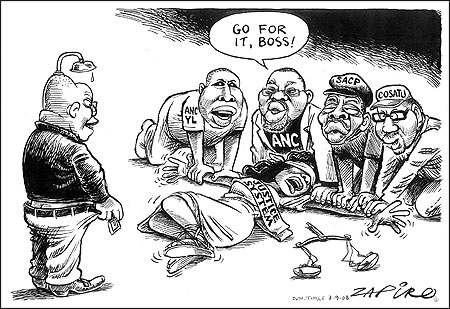
Sunday Times editorial cartoonist Zapiro depicts President Jacob Zuma unbuckling his pants while members of his government hold down Lady Justice. Two years after it was published in 2008, Zuma sued the paper and the cartoonist for $700,000. The showerhead is a satirical reference to Zuma’s statement in court that after having unprotected sex with an HIV-positive woman he showered to reduce the risk of infection. Reprinted with permission. For more Zapiro cartoons visit www.zapiro.com.
RELATED ARTICLE
“Chinese Journalists Circumvent Government's Tight Restrictions”
- Ying ChanSouth Africa's crackdown on press freedom comes at a treacherous time, as numerous countries have regressed, rather than progressed, on this front. In December Hungary's President Pal Schmitt signed a new repressive media law. In China, party leaders don't trifle with unruly media: They jail them, as the 34 Chinese journalists now in prison will attest. But China's thumping economic triumph has shown that you don't need a democracy with the necessary evil of a critical press to be a monetary success and an emergent world leader. Speak frankly to some politicians from developing countries like Nigeria and South Africa, and they point to China as evidence of why an ambitious country doesn't need a free press. It's scant consolation that the WikiLeaks debacle shows that American political figures such as Senate Minority Leader Mitch McConnell and potential 2012 presidential candidate Mike Huckabee share this same sketchy grasp of the concept.
Quite how this nasty assault on press freedom will play out in South Africa remains uncertain. Journalists have been almost hysterical in decrying the assault on their freedom, but underlying this is a sense of disbelief that this could be happening again—in the new South Africa of Nelson Mandela. In a sense, it seems that the country is at a crossroads, with its treatment of the press an indicator of which way it will turn. It is of little comfort to know that many other countries are at that same junction.
Rob Rose, a 2011 Nieman Fellow, is an investigative reporter in the business section of the Sunday Times, based in Johannesburg, South Africa.
